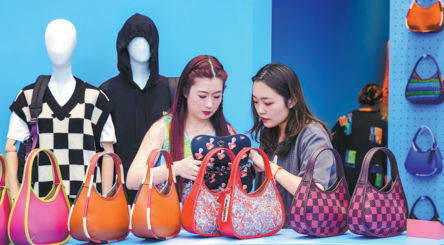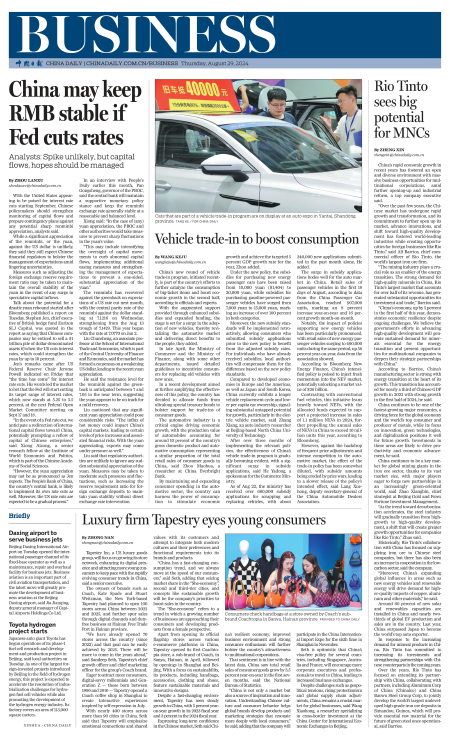
Consumers check handbags at a store owned by Coach's sub-brand Coachtopia in Sanya, Hainan province.
Tapestry Inc, a US luxury goods group, will focus on growing its store network, enhancing its digital presence and attracting more young consumers to keep pace with the rapidly evolving consumer trends in China, said a senior executive.
The owners of brands such as Coach, Kate Spade and Stuart Weitzman, the New York-based Tapestry had planned to open 100 stores across China between 2022 and 2025, and further spur sales through digital channels and duty-free business at Hainan Free Trade Port in Hainan province.
"We have already opened 70 stores across the country (since 2022) and that goal can be easily achieved by 2025. There will be more to come in the years ahead," said Sandeep Seth, Tapestry's chief growth officer and chief marketing officer for the group's Coach brand.
Eager to attract more consumers, digital-savvy millennials and Generation Z — those born between 1996 and 2010 — Tapestry opened a Coach coffee shop in Shanghai to create interactive experiences inspired by self-expression in July.
With nearly 400 stores across more than 90 cities in China, Seth said that Tapestry will emphasize emotional connections and shared values with its customers and attempt to integrate both modern cultures and their preferences and functional requirements into its brands and products.
"China has a fast-changing consumption trend, and we always move at the speed of our consumers," said Seth, adding that seizing market share in the "She-economy", second and third-tier cities, and concepts like sustainable growth will be the company's priorities to boost sales in the country.
The "She-economy" refers to a trend in which a growing number of businesses are approaching their consumers and developing products from a female perspective.
Apart from opening its official flagship stores across various e-commerce platforms in China, Tapestry opened its first Coachtopia store, a sub-brand of Coach, in Sanya, Hainan, in April, followed by openings in Shanghai and Beijing. With a focus on sustainability, its products, including handbags, accessories, clothing and shoes, feature sustainable materials and innovative designs.
Despite a fast-changing environment, Tapestry has seen steady growth in China, with 5 percent year-on-year growth in its 2023 fiscal year and 3 percent in the 2024 fiscal year.
Expressing long-term confidence in the Chinese market, Seth said China's resilient economy, improved business environment and strong consumer enthusiasm will further bolster the country's attractiveness to multinational corporations.
That sentiment is in line with the latest data. China saw total retail sales of consumer goods grow by 3.5 percent year-on-year in the first seven months, said the National Bureau of Statistics.
"China is not only a market but also a source of inspiration and innovation. Understanding Chinese culture and consumer behavior helps global brands develop products and marketing strategies that resonate more deeply with local consumers," he said, adding that the company will participate in the China International Import Expo for the sixth time in Shanghai in November.
Seth is optimistic that China's visa-free policy for several countries, including Singapore, Australia and France, will encourage more corporate executives and professionals to travel to China, leading to increased business exchanges.
Despite challenges such as geopolitical tensions, rising protectionism and global supply chain adjustments, China remains a crucial market for global businesses, said Wang Xiaohong, a researcher specializing in cross-border investment at the China Center for International Economic Exchanges in Beijing.
zhongnan@chinadaily.com.cn

